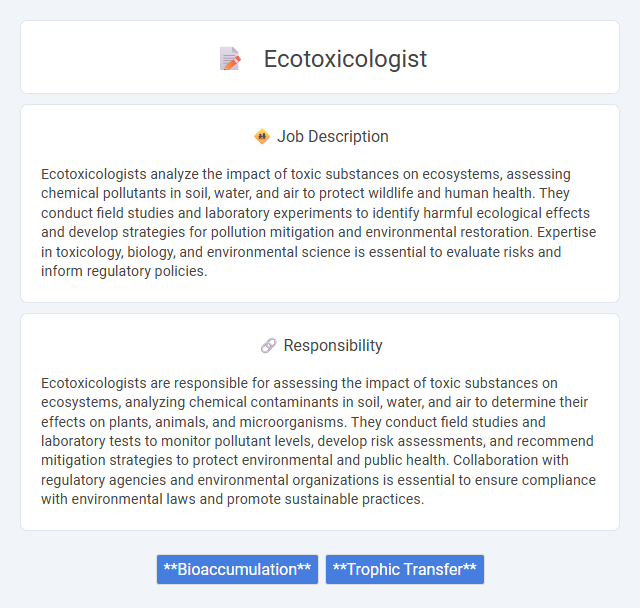
Ecotoxicologists analyze the impact of toxic substances on ecosystems, assessing chemical pollutants in soil, water, and air to protect wildlife and human health. They conduct field studies and laboratory experiments to identify harmful ecological effects and develop strategies for pollution mitigation and environmental restoration. Expertise in toxicology, biology, and environmental science is essential to evaluate risks and inform regulatory policies.
Individuals with a strong interest in environmental science and a solid background in biology or chemistry are likely to be well-suited for a career as an ecotoxicologist. This role often requires analytical skills, attention to detail, and the ability to work in both laboratory and field settings, which may suit those who are comfortable in varied and sometimes challenging environments. People who prefer collaborative research and have a passion for protecting ecosystems and public health may find this job particularly rewarding and fulfilling.
Qualification
Ecotoxicologists typically hold a bachelor's or master's degree in environmental science, biology, chemistry, or toxicology, with advanced roles often requiring a Ph.D. Proficiency in analytical techniques, risk assessment, and environmental regulations is essential, alongside strong skills in data analysis and field sampling. Experience with laboratory experiments, chemical exposure assessment, and ecological impact studies enhances qualifications for positions in research, consulting, or regulatory agencies.
Responsibility
Ecotoxicologists are responsible for assessing the impact of toxic substances on ecosystems, analyzing chemical contaminants in soil, water, and air to determine their effects on plants, animals, and microorganisms. They conduct field studies and laboratory tests to monitor pollutant levels, develop risk assessments, and recommend mitigation strategies to protect environmental and public health. Collaboration with regulatory agencies and environmental organizations is essential to ensure compliance with environmental laws and promote sustainable practices.
Benefit
Ecotoxicologists likely find their work rewarding due to the crucial role they play in assessing and mitigating the effects of pollutants on ecosystems, which helps protect biodiversity. The profession may offer opportunities for meaningful contributions to environmental policy and sustainable development. Job stability and growth potential could be favorable as environmental concerns continue to rise globally.
Challenge
Ecotoxicologists likely face the challenge of accurately assessing the impact of pollutants on diverse ecosystems due to complex environmental variables and limited data availability. They probably need to develop innovative methods to predict long-term ecological effects while managing uncertainties inherent in environmental testing. Navigating regulatory requirements and balancing industrial interests with environmental protection may present ongoing difficulties in their work.
Career Advancement
Ecotoxicologists specializing in environmental toxicology can advance their careers by gaining expertise in chemical risk assessment and regulatory compliance, leading to senior research or consultancy roles. Developing skills in data analysis, field studies, and interdisciplinary collaboration opens opportunities in governmental agencies, pharmaceuticals, or environmental protection organizations. Pursuing advanced degrees and professional certifications enhances prospects for leadership positions and influence in policy development related to ecosystem health and contaminant impact.
Key Terms
Bioaccumulation
Ecotoxicologists specializing in bioaccumulation study the accumulation of toxic substances like heavy metals and persistent organic pollutants in aquatic and terrestrial organisms. They analyze how these toxins move through food webs, impacting species health and ecosystem stability. Their work informs environmental risk assessments and the development of regulations to limit pollutant exposure.
Trophic Transfer
Ecotoxicologists specializing in trophic transfer study how contaminants move through food chains, impacting organisms at various ecological levels. Their research quantifies bioaccumulation and biomagnification of pollutants, essential for assessing ecosystem health and predicting risks to wildlife and humans. Advanced analytical methods and modeling techniques help identify critical exposure pathways and inform regulatory policies.
 kuljobs.com
kuljobs.com